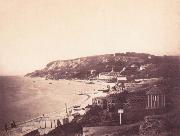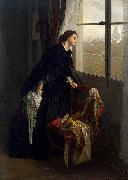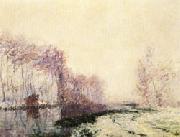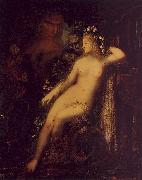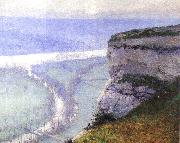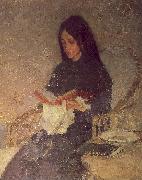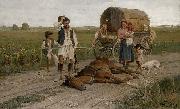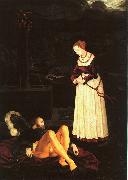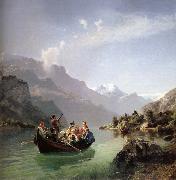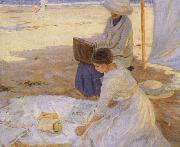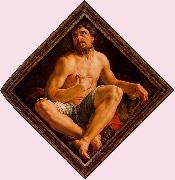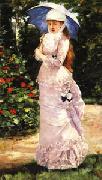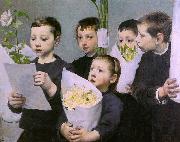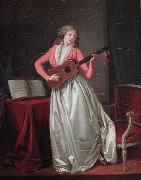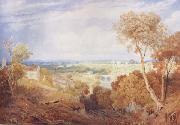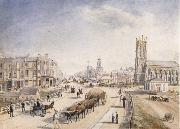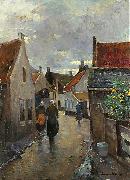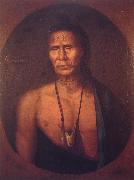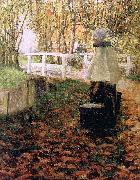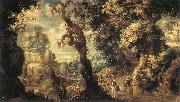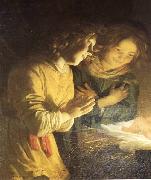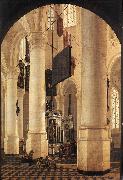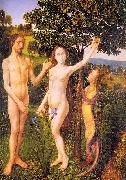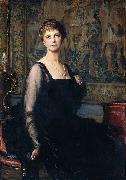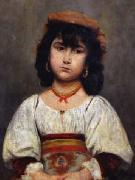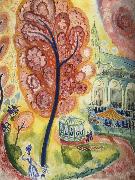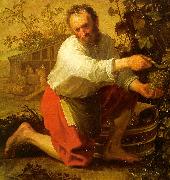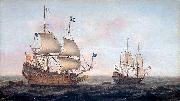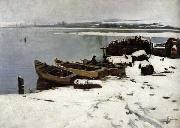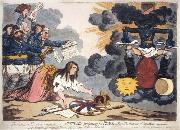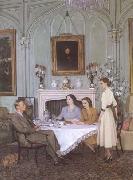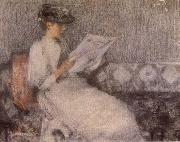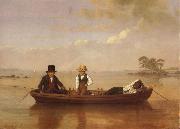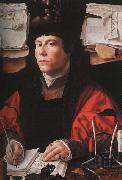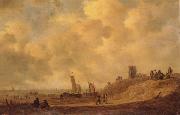|
|
|
|
|
|
|
|
|
|
|
|
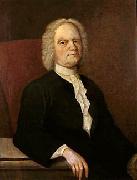 |
Gustavus Hesselius
|
|
(1682 - May 25, 1755) was a Swedish born painter who emigrated to the New World in 1711. He was the father of painter John Hesselius and cousin of the religious leader Emanuel Swedenborg.
Hesselius left his home country of Sweden for Wilmington, Delaware in 1711. There he lived until 1717 when he moved to Philadelphia, Pennsylvania, where he lived until 1721. In 1721, he moved to Prince George's County, Maryland and became a portrait painter, though he had been trained in Sweden. That same year, he received the first recorded public art commission in the American colonies, he painted The Last Supper. He also painted a Crucifixion. Some time around 1735, Hesselius returned to Philadelphia where spent the rest of his life and traveling. He was listed as a member of the Gloria Dei (Old Swedes') Church in Philadelphia.
He also worked as an organ builder, having built an organ for the Moravian Church in Bethlehem, Pennsylvania in 1746. From about this time on, he focused on building organs, referring painting commissions to his son John.
J. Hall Pleasants has said that Hesselius became "America's earliest portrait painter of note." In 1994 he was named to the Prince George's County Hall of Fame.
|
|
|
|
|
|
|
|
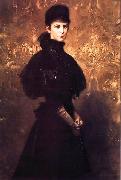 |
Gyula Benczur
|
|
Gyula Benczur (1844 - 1920) was a Hungarian painter and pedagogue. He won international success with his first few paintings, winning several competitions. He assisted Karl von Piloty with the frescoes of Maximilianeum and Rathaus in Munich. He also illustrated books by the great German writer, Friedrich Schiller. He was commissioned by the Bavarian king Ludwig II to paint Rococo themes. Later he was offered numerous international teaching positions, including offers in Prague and Weimar, but accepted a position in Munich, one of his most distinguished pupils being the Swiss-born American painter Adolfo Meller-Ury. Benczur was later a favorite among the Hungarian upper-class, painting numerous portraits of kings and aristocrats. He was considered a rival in historical painting to Makart. During his lifetime, Benczur won numerous awards. His self-portrait is on display at the Uffizi Gallery in Florence. |
|
|
|
|
|
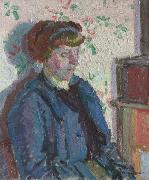 |
Harold Gilman
|
|
(11 February 1876 - 12 February 1919) was a painter of interiors, portraits and landscapes, and a founder-member of the Camden Town Group.
Though born in Rode, Somerset, Gilman spent his early years at Snargate Rectory, in the Romney Marshes in Kent, where his father was the Rector. He was educated in Kent at Abingdon, Rochester and Tonbridge schools, and for one year at Brasenose College in Oxford University.
Although he developed an interest in art during a childhood convalescence period, Gilman did not begin his artistic training until after his non-collegiate year at Oxford University (cut short by ill health) and after working in the Ukraine as a tutor to a British family in Odessa (1895). In 1896 he entered the Hastings School of Art to study painting, but in 1897 transferred to the Slade School of Fine Art in London, where he remained from 1897 to 1901, and where he met Spencer Gore. In 1904 he went to Spain and spent over a year studying Spanish masters (Velezquez and Goya as well as Whistler were major early influences).
At this time he met and married the American painter Grace Cornelia Canedy. The couple settled in London (apart from a visit to her family in Chicago, when Gilman ducked pressure to join the Canedy family business). They had two daughters (one in London, one in Chicago).
|
|
|
|
|
|
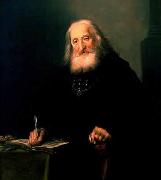 |
Hendrik Gerritsz. Pot
|
|
(c. 1580 - 15 October 1657 (buried)) was a Dutch painter. He lived and painted in Haarlem, where he was an officer of the militia, or schutterij. Dutch artist Frans Hals painted Pot in militia sash in Hals' The Banquet of the Officers of the St George Militia Company (c. 1639). Pot is the man reading a book on the far right.
Pot was born in Amsterdam and spent his early years in Amsterdam and Haarlem. In 1632 he traveled to London, where he painted the Royal Family. He lived from 1633 to 1648 in Haarlem, after which he moved to Amsterdam, where he died in 1657.. He served as Dean of the Haarlem Guild of St. Luke in 1626, 1630 and 1635. He served as the Guild's headman or Hoofdman in 1634 and 1648. He died in Amsterdam. |
|
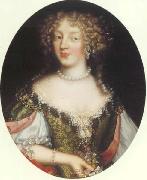 |
Henri Gascar
|
|
Henri Gascar, Portrait of Barbara Palmer, 1st Duchess of Cleveland
James II of England, then Duke of York (1660s)Henri Gascar (1635 -1 Jan 1701) was a French-born portrait painter who achieved artistic success in England during the reign of Charles II. He painted many leading ladies at court, including several of the King's mistresses.
Gascar was born in Paris, the son of Pierre Gascar, a minor painter and sculptor. Gascar came to England about 1674, probably at the behest of Louise de Keroualle, Duchess of Portsmouth, Charles II's favourite mistress. Gascar (or Gascard, as he seems to have spelt his name at first) was already known as a skillful portrait-painter; among the portraits already painted by him was that of Nicolas de Lafond, author of the "Gazette of Holland", painted in 1667, and engraved by Peter Lombart.
The patronage of the Duchess of Portsmouth insured Gascar a rapid success in England. His flamboyant style, contrasting with the stolid English approach, seemed to suit the frivolity of the time and he painted many of the ladies of Charles II's court. His lack of attention to detail in the likeness he made up for by the sumptuous draperies and tawdry adornments around the subject. For a short time he became fashionable, and is said to have amassed a fortune of over £10,000.
Among the portraits painted by him during his time in England were Charles II (engraved by Peter Vanderbank); Louise, Duchess of Portsmouth (twice - once engraved by Étienne Baudet); Barbara, Duchess of Cleveland (nee Villiers), and her daughter, Barbara Fitzroy; Charles Lennox, 1st Duke of Richmond; Frances Stewart, Duchess of Richmond; George FitzRoy, 1st Duke of Northumberland; Nell Gwyn; Sophia Bulkeley (engraved by Robert Dunkarton); Edmund Verney; and Philip Herbert, 7th Earl of Pembroke. It is stated that the last-named portrait was done surreptitiously for Louise, Duchess of Portsmouth. A portrait by Gascar of James II as Duke of York was in that king's collection. |
|
|
|
|
|
|
|
|
|
|
|
|
|
|
|
|
|
|
|
|
|
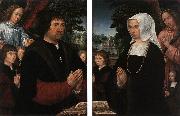 |
HORENBOUT, Gerard
|
|
Flemish Northern Renaissance Painter and Manuscript Illuminator, ca.1465-1541 |
|
|
|
|
|
|
|
|
|
|
|
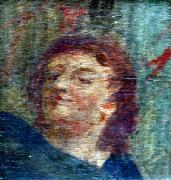 |
Ivan Grohar
|
|
Ivan Grohar (15 June 1867 - 19 April 1911) was a Slovene Impressionist painter. Together with Rihard Jakopič, Matej Sternen and Matija Jama, he is considered one of the leading figures of Slovene impressionism in the fin de siecle period.
Grohar was born in the Upper Carniolan village of Spodnja Sorica, then part of the Austro-Hungarian Empire. From an early age, he showed an interest in art but he could not develop his talent because he was an orphan and lived in poverty. In 1888, the local vicar Anton Jamnik sent him to an exhibition in the nearby town of Škofja Loka, enabling him to spend the summer working in the town of Kranj under the supervision of the church painter Matija Bradaška. He also travelled to Zagreb, where he worked in the atelier of Spiridion Milanesi, until he was conscripted into the Austro-Hungarian Army. He disliked the military life, so he deserted and fled to Venice, in Italy. Left with nothing, he appealed to the Austro-Hungarian consulate. In 1889 a court sentenced him to a short stay in prison and extended his military service by one year.
Ivan Grohar: Brna from 1899In 1892, he applied to the Carniolan Provincial Diet for financial assistance to study at the Graz school of painting, which he received. Two years later, he applied for assistance to study at the Academy of Fine Arts in Vienna. This assistance was also approved, but despite his excellent exam result, he was not accepted to the Academy because he had not finished his studies in Graz. He continued his schooling in Graz and finished it at the end of 1894. In August 1896, he opened his own atelier in Škofja Loka. He also worked in Munich, where he attended Anton Ažbe school of art. Back home, he befriended the impressionist painter Rihard Jakopič. In autumn of 1900, he took part in the first Slovene Artistse Exhibition, organised by the Slovene Artistic Association (Slovensko umetniško društvo, SUD). He was elected to the position of treasurer of the SUD, but illegally borrowed money from the association, for which he was sentenced to three monthse imprisonment. On his release, he left for Vienna. |
|
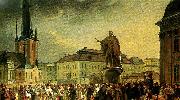 |
j. g. sandberg
|
|
Johan Gustaf Sandberg, född 1782, död 1854, var målare; han var professor i teckning vid Konstakademien från 1828, och direktör där 1845?C1853.
Sandberg ägnade sig främst åt historiemåleri, med motiv ur nordisk mytologi och svensk historia. Hans främsta verk inom detta område är kalkmålningarna över Gustav Vasa i Uppsala domkyrka. Han målade också en mängd porträtt.
Efter akademiska studier i Åbo med början 1783, och Uppsala, dit han flyttade 1788, blev han filosofie magister 1791. Han blev 1792 extra ordinarie kanslist i akademiska kansliet. Juris utriusque kandidat blev han 1792 och kort därefter docent vid juridiska fakulteten, blev juris licentiat 1800 och utnämndes 1807 till jurisprudentiä, oeconomiæ et commerciorum professor i Uppsala. Juris utriusque doktor 1810; arbetande ledamot i Lagkommissionen 1811-1814; ledamot av Krigsvetenskapsakademien 1810, Lantbruksakademien 1812, Vetenskapssocieteten i Uppsala 1829 samt flera andra lärda samfund. År 1834 erhöll han adlig värdighet och tog avsked från sin professur 1837. Lars Rabenius ligger begravd på Uppsala gamla kyrkogård. |
|
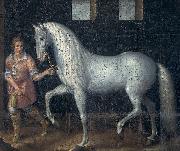 |
Jacob de Gheyn II
|
|
Jacob de Gheyn II (also Jacques de Gheyn II) (c. 1565, Antwerp - March 29, 1629, The Hague) was a Dutch painter and engraver, whose work shows the transition from Northern Mannerism to Dutch realism over the course of his career.
|
|
|
|
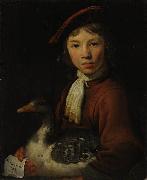 |
Jacob Gerritsz. Cuyp
|
|
was a portrait and landscape painter. He was born and died in Dordrecht, and was the half-brother of Benjamin Gerritsz Cuyp and the father of the much more famous Aelbert Cuyp.
According to Houbraken, he helped the painters Jacques de Claeuw, Isaac van Hasselt, and Cornelis Tegelberg set up a Guild of Saint Luke in Dordrecht in 1642.
|
|
|
|
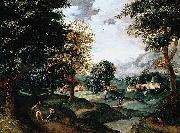 |
Jacob Grimmer
|
|
(ca. 1526-1590) was a Flemish Renaissance landscape painter.
Grimmer was born and died in Antwerp. According to Karel van Mander he first learned to paint landscapes from Matthys Cock and later from Christiaen Queburgh, both of Antwerp. He was a very skilled painter of houses, sky, and foreground views. He was a member of the Guild of St. Luke who was active as a rederijker and acted in many plays.
According to the RKD his earliest dated work is from 1546 and his latest dated work was 1589. Most of his works are landscapes and he worked together with Gillis Mostaert. Abel Grimmer was his son and pupil.
|
|
|
|
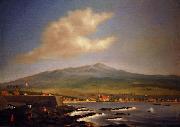 |
James Gay Sawkins
|
|
(1806-1878) was an artist who was born in 1806 in Yeovil, Somerset, England. At the age of 14, he moved to Baltimore, Maryland with his family, where he made his living painting miniature portraits on ivory. He lived in Cuba from 1835 to 1845 and visited Hawaii from January, 1850 to June, 1852. After working in Australia, he returned to England in 1855. Sawkins died in 1878 in Turnham Green (near London), England.
The Honolulu Academy of Arts, Mission House Museum (Honolulu, Hawaii) and the National Library of Australia (Canberra) are among the public collections holding works by James Gay Sawkins.
|
|
|
|
|
|
|
|
|
|
|
|
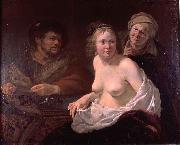 |
Jan Gerritsz. van Bronckhorst
|
|
(1603-1661) was a Dutch Golden Age painter and engraver. He is considered today to be a minor member of the Utrecht Caravaggisti group.
According to Houbraken, van Bronckhorst apprenticed as an eleven-year-old with the glass engraver Verburgh in Utrecht. He worked with him for 6 months and worked with two other Utrecht glassworkers before embarking on a Grand Tour in 1620. He did not get far before he was offered work in Arras by the glassworker Peeter Matthys. After six months, he continued on to Paris in 1620, where he worked with the glassworker Chamu. He returned to Utrecht in 1622, where Cornelis Poelenburg taught him to paint. He married Catalijntje van Noort in 1626. He frequented the studio of Gerard van Honthorst. In 1647 he moved to Amsterdam where he created the stained glass windows and the organ doors (almost the only area in a Calvinist church where figurative painting was sometimes allowed) of the Nieuwe Kerk (finished in 1655). He has been described as the last of the great stained glass painters in Holland.. Unlike his work for churches, his secular paintings show the influence of Caravaggio, and also show a striking appeal to sensuality. Among his pupils are counted his sons Jan Jansz and Gerrit Jansz, and Cesar van Everdingen. |
|
|
|
|
|
|







